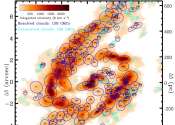A Russian cosmonaut becomes the first person to spend 1,000 days in space
A 59-year-old Russian cosmonaut has become the first person to spend 1,000 days in space, Russian space agency Roscosmos said Wednesday.

A 59-year-old Russian cosmonaut has become the first person to spend 1,000 days in space, Russian space agency Roscosmos said Wednesday.
Space Exploration
Jun 5, 2024
0
4

When chiral gold nanoparticles are irradiated with near-infrared femtosecond pulses, visible emission of luminescence is observed. In a study published in Advanced Optical Materials, this luminescence was found to yield high ...
Nanophysics
Jun 5, 2024
0
38

A research team in China has initiated and successfully developed a jet origin identification technology which can significantly enhance the scientific discovery capabilities of high-energy collider experiments.
General Physics
Jun 5, 2024
0
72

The length of telomeres that protect the ends of our chromosomes should be tightly regulated. Those that are too long predispose to cancer, and those that are too short lose their protective ability, resulting in telomere ...
Cell & Microbiology
Jun 5, 2024
0
75

Using the Atacama Large Millimeter/sub-millimeter Array (ALMA), an international team of astronomers has performed high-resolution observations of a nearby galaxy known as NGC 613. Results of the observational campaign, published ...

With legs like a velociraptor and a striking neon blue neck, the southern cassowary cuts a fearsome figure in the rainforests of northeast Australia.
Plants & Animals
Jun 5, 2024
0
153

Heavy rain washed volcanic mud and debris through a village in the central Philippines on Wednesday, two days after a nearby volcano erupted.
Environment
Jun 5, 2024
0
42

New research has connected warming ocean temperatures to higher Pacific salmon abundance in the Canadian Arctic, an indicator that climate change is creating new corridors for the fish to expand their range.
Plants & Animals
Jun 5, 2024
0
489

Bronze cauldrons were used by the inhabitants of the Mongolian steppe around 2,700 years ago to process animal blood and milk. This is shown by a protein analysis of archaeological finds from this period.
Archaeology
Jun 5, 2024
0
188

Australian scientists from the University of Sydney and Australia's national science agency, CSIRO, have detected what is likely a neutron star spinning slower than any other ever measured.
Astronomy
Jun 5, 2024
1
120